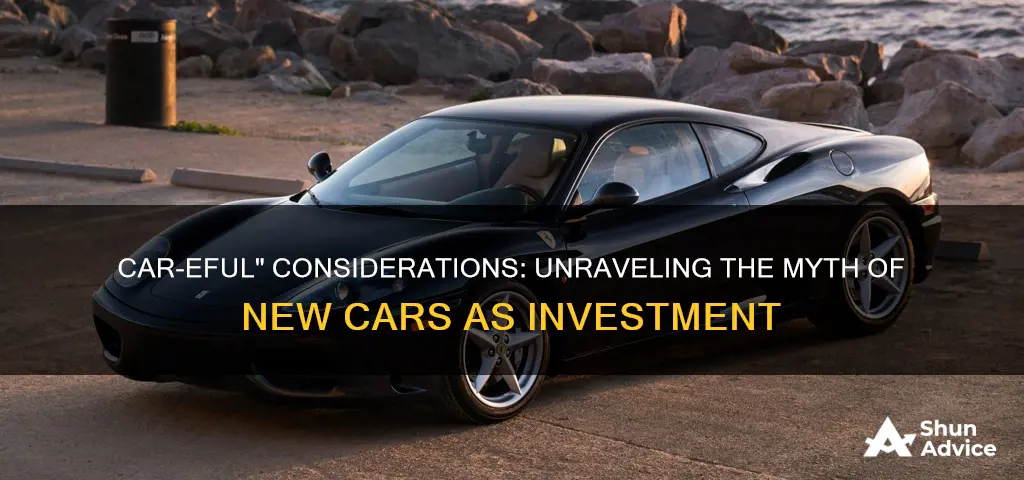
While buying a car is necessary for many people, it is not usually considered a good investment. This is because cars are depreciating assets, and their value can decrease by up to 20% in the first year of ownership alone. In addition to the high cost of a new vehicle, there are also ownership costs, which can be substantial. According to 2022 data from AAA, the average annual cost of owning a mid-priced new vehicle is $10,738. This includes expenses such as gas, maintenance, repairs, and insurance.
However, buying a car can be beneficial to your quality of life and employability. It can provide you with the ability to get to work and travel for recreation. Therefore, while it may not be a good financial investment, it can still be a worthwhile purchase.
| Characteristics | Values |
|---|---|
| Financial return on investment | No |
| Quality of life return on investment | Yes |
| Depreciation | Yes |
| Cost of ownership | $10,738 per year on average |
| Cost of depreciation | $1,500 to $2,500 in the first year |
| Cost of a new car | $48,275 on average |
| Cost of an electric vehicle | $55,089 on average |
| Cost of a used car | 20% less than a new car |
| Cost of a 10-year-old car | 50% less than the original value |
| Cost of a lease | Not recommended |
| Cost of a certified pre-owned car | Lower than a non-certified pre-owned car |
What You'll Learn

A car is a depreciating asset
A car's value starts to decline the moment it leaves the dealership. This rapid depreciation makes buying a new car a poor investment choice. Within the first year, a car can lose up to 20% of its value, and by the end of the fifth year, it may have lost up to 70% of its original value. This means that a $35,000 car would be worth only about $17,500 after five years.
There are some exceptions to this depreciation rule. Classic cars, muscle cars, and certain luxury vehicles can appreciate in value over time. However, these cars are the exception rather than the norm, and their future value depends on unpredictable factors and expensive maintenance.
The high cost of car ownership further diminishes the potential for cars to be considered good investments. The average annual cost of owning a mid-priced new vehicle, including gas, maintenance, repairs, insurance, and other expenses, is over $10,000. This is a significant expense for an asset that depreciates so quickly.
While a car may not be a good financial investment, it can still be a valuable purchase. A car provides essential benefits, such as improved employability and quality of life by enabling individuals to travel for work and recreation. However, when it comes to financial returns, a car is a depreciating asset that is unlikely to provide a positive return on investment.
San Bernardino's Investment Future: When Will Private Sectors Step In?
You may want to see also

Buying a new car is a bad investment decision
While a car is beneficial to your quality of life, it is not a good investment. In fact, buying a new car is a really bad idea. A car is a depreciating asset, and it is not considered an investment like a house or stocks, which appreciate in value. In the first year of ownership, a vehicle can lose up to 20% of its value, with a further 15% lost each year for the next four or five years. This rapid depreciation means that by the five-year mark, a car has likely lost half its value.
For example, a $35,000 car would be worth approximately $17,500 after five years, losing half its value due to depreciation. By the 10-year mark, the vehicle's value will typically bottom out. This depreciation is highest for a new car. You lose 5-10% as soon as you drive it off the dealer's lot, and by the end of the first year, you've lost 8-25% of its value.
The high cost of a new vehicle is another factor that makes buying a new car a bad investment decision. The average cost of a new car is $48,275, and electric vehicles are priced even higher at an average of $55,089. With such a substantial expense, you will likely have to borrow money to purchase the car. This means paying interest on top of the already high cost of the car.
In addition to the initial cost, there are also the ongoing ownership costs associated with a car. According to 2022 data from AAA, the average annual cost of owning a mid-priced new vehicle, including gas, maintenance, repairs, insurance, and other expenses, is $10,738. These high costs can significantly impact your finances, especially if you are making the median salary. According to Ben Le Fort, financing, depreciation, gas, maintenance, and insurance can cost 25% of your after-tax income.
Instead of buying a new car, consider buying a used car or a certified pre-owned (CPO) vehicle. A CPO car has gone through a detailed inspection and comes with a warranty, and you can save thousands off the initial depreciation hit. Another option is to lease a car, although this often doesn't make financial sense as dealerships usually ensure they come out ahead financially.
In summary, buying a new car is a bad investment decision due to the rapid depreciation, high initial cost, and ongoing ownership costs. Instead, consider buying a used car or leasing to save money and avoid the financial burden of a new car.
Planning for Retirement: A Guide for 30-Somethings
You may want to see also

A new car is costly to maintain
A new car is a costly purchase, and the expenses don't stop after the initial payment. Maintenance and repair costs are inevitable and can add up quickly over the vehicle's lifetime. While these costs may be lower in the first few years due to warranty coverage, they can become significant as the car ages.
Maintenance expenses can vary depending on the make and model of the car. According to CarEdge, the brand with the lowest 10-year maintenance costs is Toyota, with an average of just under $6,000. In contrast, luxury automakers like Porsche and BMW have much higher maintenance costs, with Porsche topping the list at a staggering average of $22,075 over a 10-year period.
In addition to routine maintenance, unexpected repairs can also add to the overall cost of owning a new car. These surprise issues can be costly and are often unpredictable. As a result, it's essential to consider not just the initial price tag of a car but also the long-term maintenance and repair expenses when deciding whether to purchase a new vehicle.
Furthermore, the cost of maintenance and repairs is just one aspect of car ownership. Other expenses, such as insurance, gas, and depreciation, can also have a significant impact on the overall cost of owning a new car. According to AAA, the average annual cost of owning a mid-priced new vehicle, including these additional expenses, is $10,738 per year.
Therefore, when considering the purchase of a new car, it's essential to keep in mind that the costs don't end with the initial payment. Maintenance and repairs can be costly, and the overall expense of owning a vehicle can be significant. While a new car may provide benefits in terms of reliability and personalisation, it's important to be prepared for the ongoing financial commitment required to keep it on the road.
Investments: Votes and Voice
You may want to see also

A new car is a bad investment compared to stocks
A car is beneficial to your quality of life, but it is not a good investment. In just the first year of ownership, a vehicle can lose up to 20% of its value. This rapid depreciation makes buying a vehicle a bad investment option.
While you may buy stocks with the expectation that they will appreciate over time, a new car will depreciate in value. This doesn't mean buying a car is a bad decision—it serves an essential function for many people. But in terms of dollars and cents, it shouldn't be viewed as an investment.
The S&P 500 index, which tracks 500 large company stocks, has averaged yearly gains of about 10% since the early 1920s. This is in stark contrast to a new car, which will lose a significant portion of its value as soon as you drive it off the dealership lot.
For example, you could buy a brand-new Chevrolet Silverado 2500HD regular cab for $34,400. But by the time you get it home, it may only be worth $30,960—a depreciation of 10%. After the first year, it will be worth about $27,520, and after three years, it may only be worth about $17,200—half of what you paid for it.
On the other hand, if you were to invest that $34,400 in stocks and earned a 10% return, you would have $37,840 after the first year and $56,516 after three years. This is a much better use of your money than buying a new car, which will only lose value over time.
In addition to the depreciation, there are also the high ownership costs of a new car to consider. According to 2022 data from AAA, the average annual cost of owning a mid-priced new vehicle, including gas, maintenance, repairs, insurance, and other expenses, is $10,738. That's a significant amount of money to pay for an asset that is constantly losing value.
So, if you're looking to make a smart investment, buying stocks is a much better option than buying a new car. With stocks, you can expect a positive return on your investment over time, whereas a new car will only lose value and cost you money in ownership expenses.
Unlocking Alternative Investments: A Guide to Navigating the Buying Process
You may want to see also

Buying a used car is a better investment
While buying a car, whether new or used, is not a good investment in the traditional sense, as vehicles depreciate in value over time, buying a used car is a better option if you are looking to save money.
Firstly, buying a used car is a more financially prudent option. The value of a new car decreases by 20% as soon as it is driven off the dealership lot, and by 10% over the first year of ownership. This means that by buying a used car, you are allowing the initial owner to take the hit of this steep depreciation. For example, a two-year-old used car could be half the price of its brand-new dealership sticker price, despite having many years of use left.
Secondly, modern vehicles are built to last longer and are more reliable than older models. In the US, the average age of a vehicle on the road is 11.6 years, up from 6.7 years in 1995. This means that a five-year-old used car in good condition can easily last over 10 years with careful maintenance, and at a much lower cost than a brand-new vehicle.
Thirdly, the rise in leasing vehicles means that there are many nearly new, well-maintained cars available for purchase after their lease period ends. These cars are usually around three years old and are in top-notch condition, with their prices reduced due to being previously owned. They may also still be covered by manufacturer warranties, giving peace of mind to the new owner.
Additionally, the availability of online tools makes it easier to check a used car's accident history. With a Vehicle Identification Number (VIN) and online tools like CarFax and Carproof, buyers can now easily verify a vehicle's history and ensure it hasn't suffered any significant damage.
Lastly, insurance costs for used cars are much lower than for new cars. As vehicle value decreases during the first few years of ownership, insuring a used car will cost significantly less in the long run.
In summary, buying a used car is a better investment than buying a new car as it offers significant financial savings, longer-lasting reliability, and lower insurance costs.
Ethereum: Invest Now or Later?
You may want to see also
Frequently asked questions
No, buying a new car is not a good investment as it is a depreciating asset. In the first year of ownership, a vehicle can lose up to 20% of its value and will continue to depreciate.
New cars depreciate because they are no longer considered "new" once they leave the dealership lot.
Yes, buying a new car can provide benefits such as the ability to choose the make, model, trim, options, and colours exactly how you want them. You also get a brand-new vehicle without inheriting anyone else's problems and repairs and maintenance are usually covered by a warranty for the first few years.
Some alternatives to buying a new car include buying a used car, leasing a car, or using ride-sharing services such as Uber or Lyft.







